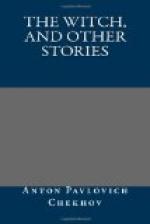The travellers had been a long while on their way, but they seemed to be always on the same small patch of ground. In front of them there stretched thirty feet of muddy black-brown mud, behind them the same, and wherever one looked further, an impenetrable wall of white fog. They went on and on, but the ground remained the same, the wall was no nearer, and the patch on which they walked seemed still the same patch. They got a glimpse of a white, clumsy-looking stone, a small ravine, or a bundle of hay dropped by a passer-by, the brief glimmer of a great muddy puddle, or, suddenly, a shadow with vague outlines would come into view ahead of them; the nearer they got to it the smaller and darker it became; nearer still, and there stood up before the wayfarers a slanting milestone with the number rubbed off, or a wretched birch-tree drenched and bare like a wayside beggar. The birch-tree would whisper something with what remained of its yellow leaves, one leaf would break off and float lazily to the ground.... And then again fog, mud, the brown grass at the edges of the road. On the grass hung dingy, unfriendly tears. They were not the tears of soft joy such as the earth weeps at welcoming the summer sun and parting from it, and such as she gives to drink at dawn to the corncrakes, quails, and graceful, long-beaked crested snipes. The travellers’ feet stuck in the heavy, clinging mud. Every step cost an effort.
Andrey Ptaha was somewhat excited. He kept looking round at the tramp and trying to understand how a live, sober man could fail to remember his name.
“You are an orthodox Christian, aren’t you?” he asked.
“Yes,” the tramp answered mildly.
“H’m... then you’ve been christened?”
“Why, to be sure! I’m not a Turk. I go to church and to the sacrament, and do not eat meat when it is forbidden. And I observe my religious duties punctually....”
“Well, what are you called, then?”
“Call me what you like, good man.”
Ptaha shrugged his shoulders and slapped himself on the haunches in extreme perplexity. The other constable, Nikandr Sapozhnikov, maintained a staid silence. He was not so naive as Ptaha, and apparently knew very well the reasons which might induce an orthodox Christian to conceal his name from other people. His expressive face was cold and stern. He walked apart and did not condescend to idle chatter with his companions, but, as it were, tried to show everyone, even the fog, his sedateness and discretion.




